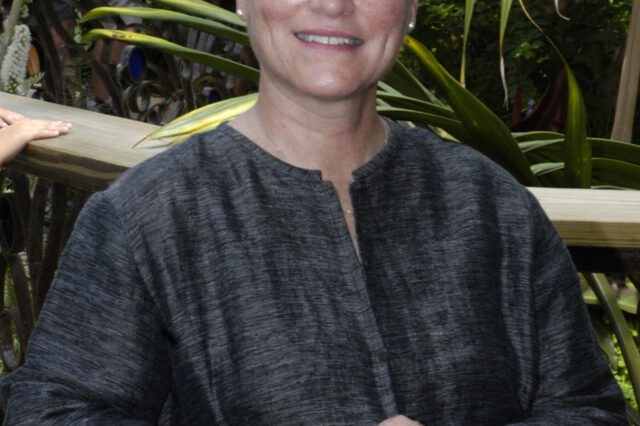UF scientist awarded grant to identify new ways to thwart HIV

Maureen M. Goodenow, Ph.D.
University of Florida AIDS researcher Maureen M. Goodenow, Ph.D., has been awarded a $400,000 two-year developmental grant through a new federal program that aims to find ways to outsmart HIV by stimulating the immune system to produce protective antibodies that could neutralize the virus.
The $15.6 million, five-year multicenter research effort is sponsored by the National Institute of Allergy and Infectious Diseases, part of the National Institutes of Health. Officials say it will strengthen and expand the scientific foundation of HIV vaccine research through a network of 10 research teams that will share resources, methods and data to accelerate progress.
The program will focus on B cells, which the immune system relies on to recognize key parts of microbes, called antigens. T cells, which kill cells infected by pathogens, spur B cells to produce antibodies, which can lock onto antigens and sweep them from the body. But HIV can fool B cells, shielding itself from antibodies or changing its antigenic parts, so antibodies can rarely rid the body of the virus.
Goodenow, the Stephany W. Holloway university chair for AIDS research at UF’s College of Medicine and director of the Florida Center for AIDS Research, will lead basic immunology studies of B cells using innovative methods and will seek to identify subsets of these cells that produce antibodies capable of targeting various strains of HIV. She is collaborating with Li Yin, Ph.D., a UF assistant professor of pathology, Connie J. Mulligan, Ph.D., a UF professor of anthropology, and John Sleasman, M.D., a professor of pediatrics at the University of South Florida and All Children’s Hospital in St. Petersburg.
“The results will provide major advancements in understanding the immune response to HIV and will form a basis for developing novel vaccine strategies to induce an effective anti-HIV response,” Goodenow said.
In recent years, investigator-initiated grants supported by the NIAID have focused more heavily on T-cell-based approaches to preventive HIV vaccines than on B-cell-based ones. Many experts believe a successful HIV vaccine will probably need to activate both T cells and B cells; consequently, federal officials say, creation of the new B-cell research program is an important stimulus for HIV vaccine discovery.
Some evidence suggests that the program’s goal of eliciting “broadly neutralizing” antibodies to HIV, although extremely difficult, may be feasible. Scientists have discovered that some HIV-infected individuals naturally but rarely produce broadly neutralizing antibodies to HIV. Giving such antibodies experimentally to monkeys protected the animals from HIV infection after exposure to the virus. Scientists now face the challenge of how to stimulate the human immune system to predictably produce broadly neutralizing antibodies to HIV through vaccination.
Other researchers receiving program grants include Dennis R. Burton, Ph.D., of The Scripps Research Institute; James E. Crowe Jr., M.D., of Vanderbilt University School of Medicine; Donald N. Forthal, M.D., of the University of California, Irvine; Min Lu, Ph.D., of Weill Cornell Medical College; Abraham Pinter, Ph.D., of the University of Medicine and Dentistry of New Jersey; Gerald V. Quinnan Jr., M.D., of the Uniformed Services University of the Health Sciences; Ignacio Sanz, M.D., of the University of Rochester School of Medicine and Dentistry; Harry W. Schroeder, M.D., Ph.D., of The University of Alabama at Birmingham; and Raul M. Torres, Ph.D., of the University of Colorado at Denver and Health Sciences Center.
About the author
